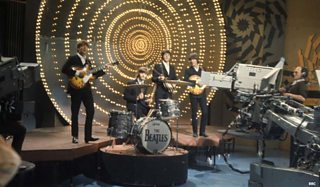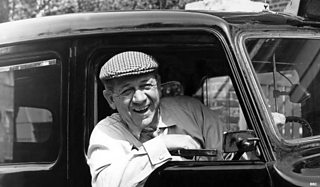
Top of the Pops - in the most recent use of that title - became somewhere where even the most obscure one-hit-wonder band could get their 3 minutes of fame
It’s hard to underestimate the importance of a good title in making a programme. It’s that first piece of branding that immediately tries to catch the viewer’s interest and give them some idea of what a programme is about.
Given that fact, it’s perhaps surprising that so many series titles have been used more than once – or perhaps it isn’t: a good title might not save a mediocre programme from cancellation, which would leave the title open for reuse after a decent interval elapsed.
is one of the best-known titles which had been used before. As well as being a stock phrase for records or acts which were successful, there was a �������� Service radio series using the title beginning on 4 February 1952, in which “hit tunes old and new” were performed by singers Dick James, Diana Coupland, Felix King, and the Stargazers, with musical accompaniment by the Steve Race Sextet. That series only lasted until May the same year, but in October 1956 there was another series called Top of the Pops, this time featuring "songs and stories from the stars", with a different guest appearing each week – Alma Cogan for example in the first edition. That show lasted all the way through to June 1957. Later in March 1963 a one-off Light Programme called Top of the Pops was a showcase for artists who appeared on the channel’s regular series Easy Beat, Go Man Go, Parade of the Pops and Saturday Club. Less than a year later, Johnnie Stewart, who had produced the first of the Top of the Pops series, and who had since become a television producer, brought us the first in the legendary television programmes, Top of the Pops.
Some words are such obvious programme titles, and so versatile or ubiquitous that it is not surprising that they are re-used – such as the many variations of . Question Time is another favourite – though the first use of that as a stand-alone programme title was for a in 1936, in which Leslie Heward answered points raised by listeners, accompanied by the �������� Midland Orchestra. A couple of years later Denis Wright had a similar programme for a narrower musical genre, in the self-explanatory . The still-extant Gardeners’ Question Time emerged in 1948, while there was a Scottish opt-out Question Time series around the same time. After a few single appearances, the title Question Time in relation to politics appears at the 1964 General Election, and in several later elections before the familiar began on �������� One in 1979.

Jennie Murray and Jane Garvey, among the many presenters of Woman's Hour. Its predecessor, Women's Hour, didn't manage quite as long a run...
Other words or phrases used as titles are so familiar on the other hand that it is harder to imagine they might have had another life. Blue Peter, for example, is a title that had appeared before its debut as a children’s magazine show in 1958: was a comic opera by A.P. Herbert that had several broadcasts in the 1920s, but there was also a series of that name in 1941, aimed at members of the .
Sometimes, strictly speaking, a name is reused with a minor variation. One such is in the case of and . The former was an early �������� programme, when part of the day was allocated to broadcasts aimed specifically at women. Its contents were fairly limited, touching on subjects such as fashion, interior decoration and "Bridge-Card manners" and it disappeared by 1925. The radio magazine programme Woman’s Hour, which was part of the offering of the newly established Light Programme in 1946, continues to this day (having migrated to Radio 4 along the way).
In the field of drama, there have also been a number of instances of the reuse of titles – not always with both examples being in that genre. For example, Pie in the Sky, as well as being a about an ex-policeman who goes into the restaurant trade, was also the name of a starring Chloe Ashcroft (who also co-created it with Peter Gosling), David Hargreaves and Ben Thomas about a flying pie… (1969-71) and were both dramas, both in their way soap operas, and both set in group GP practices. The first, developed as a replacement for the 1965-69 soap The Newcomers, debuted when �������� One began official colour transmissions. It’s notable for spawning the spin-off Owen MD, starring Nigel Stock, and for giving a prominent early role to Lynda Marchal (aka Lynda La Plante). The daytime series Doctors has been a fixture on �������� One since 2000 – it originally starred Christopher Timothy, at that time still best known for tending to sick animals rather than people.

The Sid James vehicle (geddit) Taxi! was created by Ted Willis of Dixon of Dock Green fame
Taxi is another example of a title that has been used at least three times – with or without an exclamation mark. Starting in 1941, the first was a series of "thrilling adventures" of a London taxi-driver, starring Jerry Verno, broadcast on the Forces Programme. The series was revived after the war on the Light Programme, and ran until 1953. Ten years later Sid James (around the same time as he was starring in Carry on Cabby) appeared in the �������� television drama , playing taxi driver Sid Stone, with Bill Owen and Ray Brooks as fellow London cabbies. In 1980 the �������� bought in the US sitcom (no exclamation mark this time), which featured rising stars Danny de Vito and Christopher Lloyd, among others, ans was about the misadventures of a group of New York taxi drivers.
There is no copyright in titles (though you can trademark them), though it’s unlikely that anyone would want to copy a title that was too distinctive – and it’s inevitable that some titles will crop up more often than others, just because they are the most obvious description for a particular programme or series, regardless whether they are the first time someone has used them. As the relentless demands of broadcasting continue, it’s always nice to see a new and surprising title come into use, but there will always be the occasional recurrence of an old familiar name. There has only been room to mention a few here – we could go on… perhaps you have a favourite of your own… like The Lively Arts, Spy Trap, Jigsaw, The Time of My Life, Call Me Mister…
